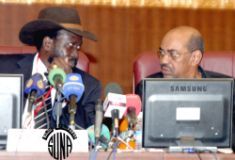UN envoy expulsion exposes Sudan’s fragile coalition govt
Oct 26, 2006 (KHARTOUM) — With a myriad of regional peace deals under his belt, Sudan’s president proudly touts his coalition government with former enemies in senior posts as a model of reconciliation and power-sharing.
 But a series of moves culminating in the expulsion of top U.N. envoy Jan Pronk has left the former rebels who are now part of Sudan’s government wondering if they have any real say over policy in Africa’s largest country.
But a series of moves culminating in the expulsion of top U.N. envoy Jan Pronk has left the former rebels who are now part of Sudan’s government wondering if they have any real say over policy in Africa’s largest country.
“This decision puts Sudan closer to the brink of confrontation with the international community,” said Yasir Arman, spokesman for the former southern rebel Sudan People’s Liberation Movement (SPLM).
Both the SPLM and former rebels from Sudan’s war-torn Darfur region who are now part of a coalition government with President Omar Hassan al-Bashir’s dominant National Congress Party say they were not consulted on the expulsion, and opposed it.
Bashir’s National Congress Party (NCP) expelled Pronk after he wrote that the Sudanese armed forces had lost two major battles against Darfur rebels, morale was low, generals had been sacked and soldiers were refusing to fight.
The move has highlighted fissures in the fragile ruling coalition in a country already divided, often along ethnic and religious lines, after multiple rebellions.
Both southern and western former rebels control a small percentage of Sudan’s ministries, a few top posts and some other government positions under peace deals signed with Khartoum.
The SPLM became a major partner in government after a 2005 north-south peace accord to end Africa’s longest civil war, and a former Darfur rebel group joined this year after signing a peace deal with Khartoum.
But key posts are still held by Bashir’s NCP, which uses its majority in parliament and government to dominate decision-making.
DARFUR FORMER REBELS NOT CONSULTED
The leader of the only one of three negotiating rebel factions to sign the Darfur peace deal, Minni Arcua Minnawi, is now the fourth-ranking official in Sudan.
But his former rebel Sudan Liberation Movement (SLM) said it was not consulted about the move to expel Pronk, which has serious implications for U.N.-Sudanese relations.
“Any decision against (Pronk)… should have be done after a wider consultation within the government of national unity,” said Mohamed Bashir, head of Minnawi’s office.
A source close to Pronk said he was reassured by a foreign ministry official that the affair would blow over, only to be summoned by that same junior minister, Ali Karti, two days later to be given 72 hours to leave the country.
Karti, a member of Bashir’s party, remains technically subordinate to Foreign Minister Lam Akol of the SPLM.
Outside government ranks, Darfur rebel leader Khalil Ibrahim said the expulsion proved the government was as dominated by the military as it was when it took over in a 1989 bloodless coup.
“This decision is one made by the army not by the government,” Ibrahim told Reuters.
Ibrahim is one of a coalition of rebels who refused to sign a May peace deal to end 3-1/2 years of revolt in Darfur, and instead renewed hostilities with the government in June.
Eastern rebels who signed a separate peace deal earlier this month, the third regional deal Khartoum has concluded in less than two years, are cautiously watching the coalition discord.
COLLISION PATH OVER DARFUR
Khartoum is already on a collision path over its rejection of a U.N. Security Council resolution to send around 22,500 U.N. troops and police to Darfur, a move Bashir has likened to a Western invasion bent on regime change.
Both the SPLM leader First Vice President Salva Kiir and Minnawi back a U.N. mission in Darfur to take over from African Union troops who have failed to stem the violence.
But their voices, from within the governing coalition, have not persuaded the dominant party to change its policy.
Experts estimate 200,000 have been killed in Darfur and 2.5 milion forced to flee their homes during violence that has included rape, killing and looting since rebels took up arms in early 2003 accusing the central government of neglect.
Bashir, himself a military man, gives almost daily speeches swearing to personally fight in any battle against U.N. troops.
Critics say he really fears U.N. troops would be used to arrest any officials likely to be indicted by the International Criminal Court investigating alleged war crimes there.
Some say the United Nations is unlikely to take hard action against the government, for fear of collapsing peace deals which took years of painstaking negotiation to achieve.
“They are not going to push the government and threaten the (southern) agreement,” one Western diplomat in Khartoum said.
Southern and Darfur former rebels have questioned whether there is a real coalition when the NCP still dominates decision-making, but both have so far refrained from threatening to pull out of government or back out on peace deals.
(Reuters)
